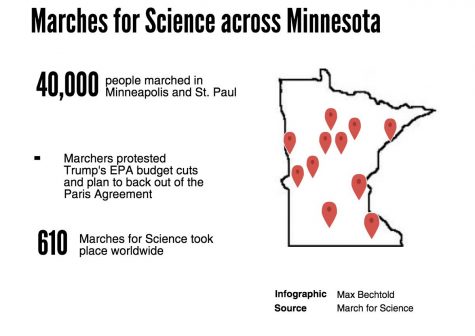March for Science unites thousands of Minnesotans
Citizens march to promote scientific research
Minnesotans gather to promote science and protest Trump’s budget cuts for science agencies, April 22.
April 30, 2017
During the Minnesota March for Science, an estimated 40,000 people marched to the Minnesota State Capitol in celebration of Earth Day, including Biology teacher Julie Schilz, who said the march was full of passion and support for science.
“The march had a really positive feel, everybody was really excited about science and the advancement of scientific research,” Schilz said. “People were also in favor of climate change and dispelling myths about climate change being a hoax.”
Sophomore Isaac Swartz said he attended the March because he thought it united the city and reinforced science.
“(The march) is really cool and supportive, and it’s great that the city came to support science together,” Swartz said.
Environmental science teacher Pat Hartman said the March informed people and changed their point of view to supporting science.
“I think (the March) is a show of solidarity. It (got) a lot of news coverage and that will send a message,” Hartman said. “I hope people against science will change their opinions.”
Hartman said he went to the march to counter anti-science voices and show his opposition to Trump regarding scientific findings related to political issues.
“I think recently a culture of ‘anti-science’ has been created, and I think it’s important to send a message that science is important and it is a real thing,” Hartman said. “After the November election, people have gotten into power and are saying things like ‘alternative facts’ and denying real things.”
 CNN Health said supporters of science marched in Germany, Switzerland, Australia, England, and Antarctica.
CNN Health said supporters of science marched in Germany, Switzerland, Australia, England, and Antarctica.
Once the march reached the Minnesota State Capitol, speakers spoke to the attendees about the importance of science, unity and standing in opposition to President Trump, according to the Minnesota March for Science.
Swartz said he wants to see the government acknowledge scientific findings and provide more funding to research.
“I want the government to have more recognition toward scientific issues and fund science more because the U.S. needs to be a leader in science again,” Swartz said.
Schilz said she marched because she wants to see more support for science from the government.
“I hope the march helps bring (attention for) the need for more scientific funding and support for scientific organizations,” Schilz said. “There are a lot of people trying to get support right now, and it was cool to see that much support for science and those people at the march.”
Hartman said he wants STEM curriculum enhanced in the United States.
“We are sorely behind Europe when it comes to science. You can talk to a person there and they are much more science-literate than in the U.S.,” Hartman said. “Science is more of a normal thing to them and not so unattainable like here.”



